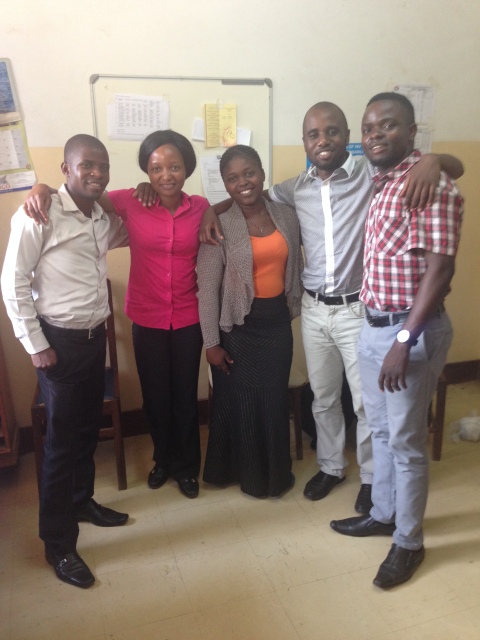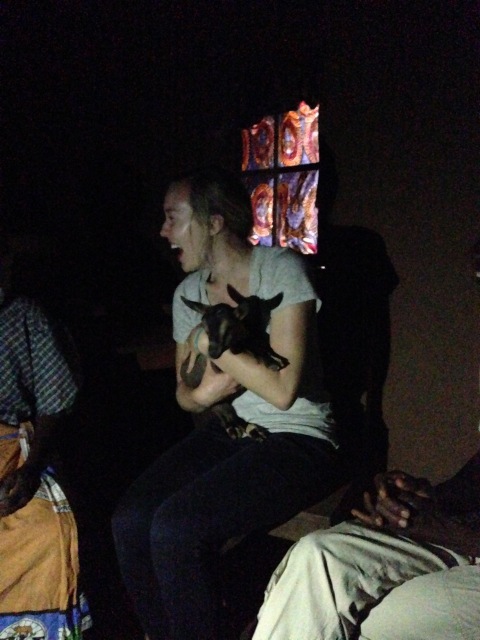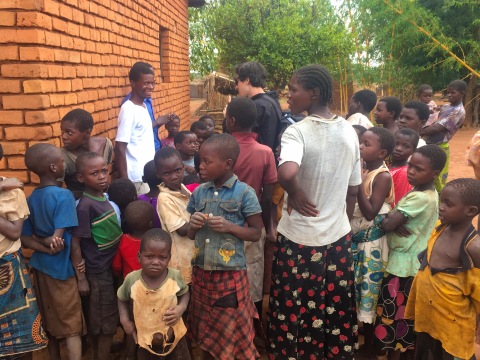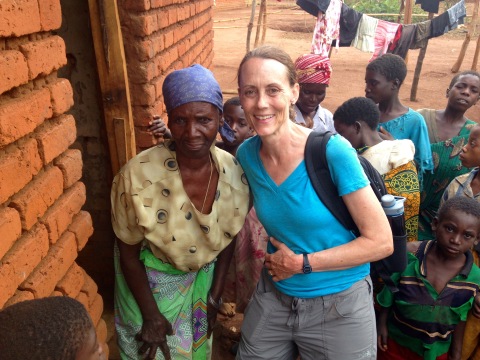Physio2 Class of 2018
January 14, 2016
The future for Malawi physical therapy is bright. And, we are in the good hands of this next generation.
I’ve had a wonderful week with the second year physical therapy students (Physio2). They have been respectful, engaged and curious. They enjoyed working in groups and asked great questions. I was most impressed with their attention to my lecture on some special topics. Knowing that the material was not going to be on their exam, they proved themselves to be life long learners.
I wish them all the best for the rest of the semester and the years to come!










Courageous pioneers
January 13, 2016
I taught a course to the first ever class of physical therapy students at the University of Malawi, College of Medicine in 2011. They have now graduated and completed their yearlong internship. Some are lecturers now at the College of Medicine. Others are working and supporting the upcoming classes of physical therapy students in their clinical education.
Those who are working at Queen Elizabeth’s Central Hospital gathered today to reflect. I told them my observation – that their eyes have changed. When I first met them their eyes showed their curiosity, yet uncertainty about the road ahead. They entered the physical therapy program knowing little about the profession. With only 24 physical therapists in the country, few people knew about physical therapy. They endured the triumphs as well as the growing pains of a new program.
Now their eyes are proud, sure and strong. They have become leaders. They are educating the medical professionals around them about physical therapy every day. And, they are bringing physical therapy to the people in Malawi.
Today as we talked, they shared their thoughts about their journey. Some mentioned that they are finding their areas of interest. Others are excited about the challenges they face everyday – the complex medical conditions that come to this referral hospital. They have all advocated for their autonomy and celebrate the fact that now their referrals mostly ask for “physical therapy review” rather than prescribing an intervention. They are testing what they have been taught – asking “can this technique really make a difference in my patient’s life?” They are always looking for the evidence for what they do. And, they are building relationships with their patients. Their successes are their greatest testimony. Others are noticing their good work. They are grateful for the mentorship of their supervisors, and now are building a community of learners so they can grow together.
Alice Namanja, Alinafe Chisalunda, Alisson Mhango, James Kaunda and Aaron Mwafulirwa….and all of the physio pioneers from that first class – you are courageous! You have felt vulnerable and faced a lot of uncertainty, but you have stayed true to your heart. You inspire me.
A memory from the class during their second year:

And, pictures of the group that gathered today:







Ndathokoza, Merrie. Munandiphunzitsa bwino!
January 12, 2016
Merrie is the daughter of the Head Master at the local primary school near the hospital. She is also a teacher – waiting for her first primary school teaching assignment. Her English is impeccable.
We met every day at lunch for Chichewa lessons for the last few weeks of my stay. Last year, I started a notebook full of phrases, questions, new vocabulary, and some of the basic Chichewa grammar rules. In my lessons, we worked though my questions. She even gave me homework so that she could check my use of the new vocabulary. Each day, I would continue to add to the notebook – if I heard someone say something I didn’t understand, or if I had tried to say something but it wasn’t understood. At this point, I know a lot of vocabulary and grammar rules – but understanding the actual use is challenging.
Merrie had such a good command of both English and Chichewa grammar that she was able to clarify the nuances of the use of the language. Chichewa is a basic language. It doesn’t have fancy vocabulary, but words are used for many things in different ways. Sometimes it takes a long sentence to translate a few words of English, and sometimes it’s just one Chichewa word that translates into a whole English sentence! And of course, the word order is all mixed up.
For example:
Mumandisangalatsa…..You make me happy!
Muyende kuchokera pamene pali mpando kufika pamene pali mpasa…Walk from the chair to the mat.
Some words are just fun to say:
Pokhapokha…unless
Pondestani phazi…put your foot down
Other phrases are incredibly useful and go a long way when teaching exercises:
Muzipanga izi or Pangani chonchi….you should do it like this
Mukatopa munene…if you get tired, tell me (speak up)
I wish Merrie all the best in her first teaching position. And, I’m grateful for her patience! I learned a lot in the short time we were together.


What I’ve been reading…
January 11, 2016
I asked my family and others gathered for Thanksgiving for book recommendations before I left form Malawi this year. And, I’ve read all of them! I don’t usually devour books, but with no electricity, my Kindle Paperwhite has been great (and holds a charge almost forever).
Thank you for your great suggestions. I’ve enjoyed them all.
On the Shortness of Life: Life is Long if You Know How to Use it by Seneca: The title gives the main point of the book away. But there are many other wonderful passages in this book. One of my favorites on tranquility:…just as even a calm sea will show some ripples, especially when it has subsided following a storm…[have] confidence in your self and the belief that you are on the right path…The Greeks call this steady firmness of mind “euthymia”, but I call it tranquility…We are, therefore, seeking a mind that can follow a smooth and steady course, well disposed to itself, happily regarding its own condition and with no interruption to this pleasure, but remaining in a state of peace with no ups and downs: that will be tranquility.
Flatlands: A Romance of Many Dimensions by Edwin Abbott: I’m not a fantasy or science fiction fan, but this book about another world with two dimensions grabbed my attention and held it! I was immediately caught up in the flat world, as well as the possibilities of worlds in many other dimensions.
Black Flags: The Rise of ISIS by Joby Warrick: This is a must-read for our times. I gained an amazing perspective on ISIS by understanding its emergence and the conditions in which it thrives.
Stumbling on Happiness by Daniel Gilbert: This book debunks all your preconceptions about happiness, but doesn’t give you many alternative ways to think about the concept of happiness….I think he needs to write a sequel. I loved the social science emphasis of the topics he addresses!
Shantaram by Gregory Roberts: This book was hilarious, tragic and riveting. I won’t spoil it for others, but I wish I’d read the authors biography before I read the book! A great story based on some of his experiences in Bombay. The book has amazing, unforgettable characters – each with endless possibilities.
So Good They Can’t Ignore You by Cal Newport: I’m already a Cal Newprot fan from his Study Hacks blog. I read this older book of his in preparation for his newest release on Deep Work. The author makes a case against just aimlessly following your passion. He’s a proponent of deliberate practice (uncomfortable, hard work that stretches your brain – accompanied by feedback from others) that helps you gather career capital. He also talks about putting yourself in the adjacent possible – on the cutting edge by using your career capital. I’m looking forward to his book and webinar on Deep Work.
The Gifts of Imperfection by Brene Brown: A favorite author of mine (I’d recommend Daring Greatly). She’s a brilliant researcher in the areas of shame, fear, and vulnerability. I love the word “couraging” that she uses. The courage, connections and compassion discussed in this book and inspire me to look for ways to live with a whole heart.
More growing families
January 7, 2016
I spent Saturday afternoon in Kwale 2 in Lilongwe visiting the Banda family. I have know them for 9 years and have loved watching their family grow. Things are difficult for this family right now. John has lost his business contract. He’s looking for business financing to operate a tricycle business so that he can support his family. Tricycles – three wheeled motorcycles with a cab in back – are the newest form of transportation in Malawi. They are cheaper than a taxi, but take you door to door unlike the minibuses.
I brought a doll for the children. And during my visit, it was quickly adopted by the young boy – very well cared for (carried on his back, wrapped in a cloth, shielded by the sun with an umbrella, bathed and covered with lotion).




Learning along the way
January 5, 2016
I’ve learned a lot from the patients and families at St. Gabriel’s and every day brings an opportunity to learn more. These are a just few thoughts on some unique aspects of my physical therapy practice here:
You can work yourself out of a job!
If I’ve done a good job educating my patients and families – by 5 in the morning, they have all done their exercises and taken a walk (or used others ways to move around) out to the courtyard where they are enjoying the morning sun. By 8, when I arrive, they are working their way back to their rooms for breakfast. Of course, I still have an important function of providing new information to the patients and families, but the basic daily routines are well taken care of.
Think about the questions….
I find that asking good questions (the right questions) is an art – and I learn a lot from my Malawian colleagues. For example (not related to physical therapy), there were two children who came to the hospital after eating what was described as “cassava”. This is a common food. The clinical officer asked the family “How long did you cook the cassava?” From the response that the family cooked the cassava for four hours – the clinical officer knew that it was not possible for the food to be cassava – it had to have been another root. I would have never thought to ask the family how long they cooked the food. Tragically, it was a poisonous root (the long duration of cooking was an attempt to detoxify the root) and one of the children died. Public health officers were sent to the village to educate the community. If I ask, for example, “After you collapsed in the field, did you come to the hospital?” I may get a negative response – because after they collapsed, they went home first (and I didn’t ask specifically what they did after they were carried home). Or a young boy who I was seeing had had a very bad motor cycle accident – who I assumed had come directly from the scene of the accident – but he had actually spend two weeks at home with a flap of muscle torn from his thigh before he came to the hospital. Sorting out the duration and order of events in the patient’s story are critical for a good picture of the patient’s history, but this is a big challenge for me.
You can expect the support of the surrounding community.
I’ve found myself teaching a patient on the ward how to do their bed exercises – intently focused on my patient and providing proper instruction. Then, only to turn around and everyone in the ward is doing the exercises along with the patient. When I’m explaining something to a patient in my broken Chichewa, I will often hear a shout from across the ward with a comment from another….”She says to look out the window”, or, even with emphasis “You have to do your exercises in the morning, afternoon and evening – every day.” If you need help, the community is always ready to jump in. They also don’t let the patients get away with false reporting (the whole ward is watching to see if the patient has done their exercises). I do agree that this is also a violation of patient privacy, but is accepted for the conditions in the crowded general wards here.
The big little chief
January 3, 2016
Alex Jr. is growing up! And, world, be ready. He is already practicing his chief’s dance and has all of the equipment to be sure you show him respect. He is an engaging, confident young boy. It is wonderful to see him thriving. If you look carefully at his expressions you will see that he has a charming, yet serious approach to his future.
I met Alex Jr.’s family the first year I came to Malawi, ten years ago. His father was a nurse on the Male ward, and his mother worked in the Labor ward. Alex became interested in physiotherapy and also became the coordinator for the community health volunteers for the hospital. Their twin girls are growing up too!
Here is a short video of his performance.
Kamangira 2015
January 1, 2016
Kamangira is about 3-4 miles from the hospital. I visit every year and take pictures of the people there. They are all closely related, so the annual photo shot has served to chronicle the life changes in this small village. It was fun to take the pictures from 2014 to them. The UOP students were part of the trip this year. CJ was the official photographer. Abby and Sarah were the keepers of the baby goats in one of the houses we visited! Most of my pictures this year are of CJ taking pictures! I will print the pictures he took and bring them back with me next year.


















